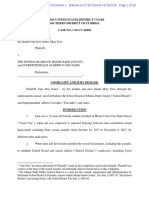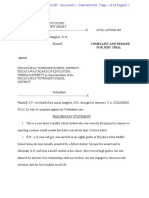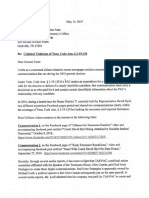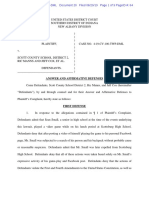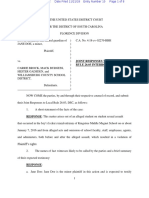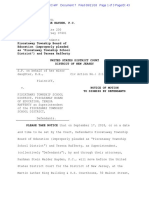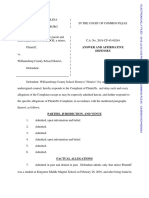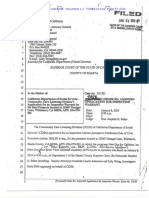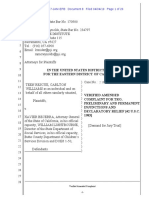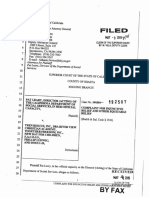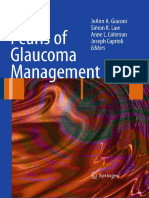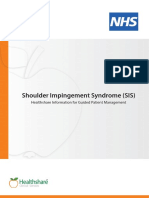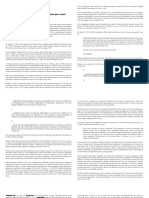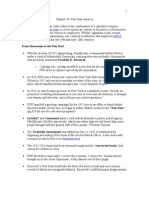Professional Documents
Culture Documents
FIRE Letter To Northwestern University, May 26, 2015
FIRE Letter To Northwestern University, May 26, 2015
Uploaded by
Tyler KingkadeOriginal Title
Copyright
Available Formats
Share this document
Did you find this document useful?
Is this content inappropriate?
Report this DocumentCopyright:
Available Formats
FIRE Letter To Northwestern University, May 26, 2015
FIRE Letter To Northwestern University, May 26, 2015
Uploaded by
Tyler KingkadeCopyright:
Available Formats
May 26, 2015
President Morton Schapiro
Northwestern University
Rebecca Crown Center 2-130
633 Clark Street
Evanston, Illinois 60208
Eric G. Neilson
Lewis Landsberg Dean and Vice President for Medical Affairs
Northwestern University Feinberg School of Medicine
Rubloff Building, 420 East Superior Street
Suite 12-109
Chicago, Illinois 60611
Sent via U.S. Mail and Electronic Mail (nu-president@northwestern.edu,
egneilson@northwestern.edu)
Dear President Schapiro and Dean Neilson:
The Foundation for Individual Rights in Education (FIRE) unites leaders in the fields of
civil rights and civil liberties, scholars, journalists, and public intellectuals across the
political and ideological spectrum on behalf of liberty, legal equality, academic freedom,
due process, freedom of speech, and freedom of conscience on Americas college campuses.
Our website, thefire.org, will give you a greater sense of our identity and activities.
FIRE is concerned by the threats to freedom of expression and academic freedom
presented by the Northwestern University Feinberg School of Medicines (FSMs) repeated
intrusions on the editorial freedom of Atrium, a publication of FSMs Medical Humanities
& Bioethics Program (MHB Program). For more than a year, the MHB Program was
pressured to censor the publication due to one issues content, and in fact took the
publication offline entirely following administrative backlash. While Atrium has since been
republished online, it now faces the potential threat of having its content reviewed before
publication by the FSM administration to avoid potential controversy in future issues. We
call on the university to promptly cease all such interference and to honor its institutional
promises of free expression and policy commitments to academic freedom.
Our understanding of the facts follows. Please inform us if you believe we are in error.
Atrium is published approximately annually and organizes each issue around a certain
theme. The most recent issue, Winter 2014, focused on the notion of Bad Girls. This issue
was guest-edited by Alice Dreger, Professor of Clinical Medical Humanities and Bioethics
at FSM, and featured contributions from authors at institutions around the country, as is
typical of Atriums editorial practices. Issues of Atrium are generally available to view and
download through the MHB Programs website in addition to being mailed out to several
thousand subscribers, most of whom are scholars and educators in medical schools and
other university-based programs.
The Bad Girls issue included an article by Syracuse University professor William J. Peace,
titled Head Nurses, in which Peace wrote about his rehabilitation after he was paralyzed
in 1978 at the age of eighteen. The article describes how in his rehabilitation ward, a few
nurses were referred to as head nurses because they were known to occasionally provide
oral sex to certain patients late at night. Peace described his own experience of being
provided oral sex by a nurse with whom he had a good relationship, a consensual act that
for him brought relief at the realization that he had not lost his ability to function sexually.
Peace credited the nurse, with whom he developed a lifelong friendship, with playing a
significant role in his psychological recovery.
When FSM dean Eric Neilson reviewed Peaces article around March 2014, after the issues
publication, he was allegedly very concerned by its content, worrying that it was
incompatible with the brand of FSM and of Northwestern Medicine, the corporate parent
overseeing the hospital system that includes FSMs primary teaching hospital. In response
to apparent requests from FSM, Atriums Bad Girls issue was removed from the MHB
Program website. For a significant period, in fact, not only the Bad Girls issue but also all
previous Atrium issues were taken offline. Though the previous issues were later restored,
Bad Girls remained unavailable on the MHB Programs website for approximately 14
months.
Dreger repeatedly tried to address and resolve this matter with FSM and members of
Northwesterns administration, including Northwestern Provost Daniel Linzer, FSM Vice
Dean for Education Diane Bronstein Wayne, and FSM Vice Dean for Academic Affairs
William L. Lowe. Despite Dregers repeated arguments that the pressure to censor Atrium
was incompatible with Northwesterns commitment to academic freedom, discussions
remained inconclusive, and the Bad Girls issue remained offline. It was not until May 18,
2015one day after Dreger notified Wayne that she and Peace both planned to publicize
Atriums censorshipthat the matter was temporarily resolved. In her response to Dreger,
Wayne wrote, At the current time we have no objection to . . . reposting the prior published
Atrium issues on the humanities and bioethics website. Atriums Bad Girls issue is now
republished in its entirety, along with the prior Atrium issues.
Though Atriums past issues are currently free of censorship, FIRE has been informed that
a new committee consisting in part of senior FSM administrators and external relations
officials has been charged with evaluating the prospective content of the next issuea
significant departure from Atriums prior editorial practices, which did not include any
administrative editorial involvement.
The chilling effect this episode has almost certainly cast on Atriums contributors and the
MHB Program, both through the pressure to censor past works and the threat of
administrative prior review of future works, is deeply concerning to FIRE and
unacceptable at a university claiming to value academic freedom, as Northwestern does.
Indeed, Northwesterns statement on academic freedom is the very first item in the current
Northwestern University Faculty Handbook, adapted directly from the American
Association of University Professors (AAUPs) 1940 Statement of Principles on Academic
Freedom and Tenure. That AAUP statement in turn posits that [i]nstitutions of higher
education are conducted for the common good, which depends on the free search for
truth and its free exposition. These sentiments have been bolstered further by the
Supreme Court, which has identified academic freedom a special concern of the First
Amendment, and observed that [o]ur Nation is deeply committed to safeguarding
academic freedom, which is of transcendent value to all of us and not merely to the teachers
concerned. Keyishian v. Board of Regents, 385 U.S. 589, 603 (1967).
Interference in the academic freedom of the MHB Program and its faculty members deeply
contradicts these principles. Further, Atriums treatment raises the concern that it is being
held to an indefensible, content-based double standard. We note that numerous other FSM
academic programs and institutes publish a variety of newsletters, blogs, and journalsall
seemingly without administrative interference. Whats more, FSM encourages the
independent expression of its faculty and staff. The FSM Office of Communications
blogging guidelines, for instance, list numerous faculty and departmental blogs covering a
wide variety of topics and disciplines, with the commonsense disclaimer that the opinions
expressed in these blogs are those of the individual authors and do not necessarily
represent the views of the Feinberg School of Medicine or Northwestern University. The
Office of Communications differentiates those publications from those that it publishes
itself, which include the monthly Breakthroughs newsletter and the quarterly Northwestern
Medicine Magazine.
Despite Northwesterns stated commitments to academic freedom, FIRE is concerned that
FSM or Northwestern Medicine will now assert ownership of Atrium so that it can take a
more active role in managing its content. This raises serious concerns not only for Atriums
autonomy but also for that of any faculty or departmental publication that dares to venture
into uncomfortable or controversial territory. It is particularly concerning that this should
occur at a medical school, where the spirit of unfettered inquiry and debate ought to be
especially robust, given the potential implications for humankind of their outcomes. In this
regard the following statement from the AAUPs 1999 statement on Academic Freedom in
the Medical School is particularly relevant: The freedom to pursue research and correlative
right to transmit the fruits of inquiry to the wider communitywithout limitations from
corporate or political interests and without prior restraint or fear of subsequent
punishmentare essential to the advancement of knowledge.
Northwesterns faculty is owed better, and Northwestern must honor the commitments to
academic freedom it has made. FIRE calls on Northwestern University and the
Northwestern University Feinberg School of Medicine to reaffirm the academic freedom of
its faculty and to disavow administrative interference of the type seen here. FSM in
particular, in keeping with its academic freedom obligations, must abandon any future
plans to dictate or censor Atriums content, and must not subject the publication to prior
review. Northwestern must recognize that when academic freedom becomes subservient to
branding concerns and public relations, it ceases to exist at all.
We request a response to this letter by June 9, 2015.
Sincerely,
Peter Bonilla
Director, Individual Rights Defense Program
cc:
Daniel Linzer, Provost, Northwestern University
William L. Lowe, Vice Dean for Academic Affairs, Northwestern University Feinberg
School of Medicine
Diane Bronstein Wayne, Vice Dean for Education, Northwestern University Feinberg
School of Medicine
You might also like
- The Subtle Art of Not Giving a F*ck: A Counterintuitive Approach to Living a Good LifeFrom EverandThe Subtle Art of Not Giving a F*ck: A Counterintuitive Approach to Living a Good LifeRating: 4 out of 5 stars4/5 (5813)
- The Gifts of Imperfection: Let Go of Who You Think You're Supposed to Be and Embrace Who You AreFrom EverandThe Gifts of Imperfection: Let Go of Who You Think You're Supposed to Be and Embrace Who You AreRating: 4 out of 5 stars4/5 (1092)
- Never Split the Difference: Negotiating As If Your Life Depended On ItFrom EverandNever Split the Difference: Negotiating As If Your Life Depended On ItRating: 4.5 out of 5 stars4.5/5 (844)
- Grit: The Power of Passion and PerseveranceFrom EverandGrit: The Power of Passion and PerseveranceRating: 4 out of 5 stars4/5 (590)
- Hidden Figures: The American Dream and the Untold Story of the Black Women Mathematicians Who Helped Win the Space RaceFrom EverandHidden Figures: The American Dream and the Untold Story of the Black Women Mathematicians Who Helped Win the Space RaceRating: 4 out of 5 stars4/5 (897)
- Shoe Dog: A Memoir by the Creator of NikeFrom EverandShoe Dog: A Memoir by the Creator of NikeRating: 4.5 out of 5 stars4.5/5 (540)
- The Hard Thing About Hard Things: Building a Business When There Are No Easy AnswersFrom EverandThe Hard Thing About Hard Things: Building a Business When There Are No Easy AnswersRating: 4.5 out of 5 stars4.5/5 (348)
- Elon Musk: Tesla, SpaceX, and the Quest for a Fantastic FutureFrom EverandElon Musk: Tesla, SpaceX, and the Quest for a Fantastic FutureRating: 4.5 out of 5 stars4.5/5 (474)
- Her Body and Other Parties: StoriesFrom EverandHer Body and Other Parties: StoriesRating: 4 out of 5 stars4/5 (822)
- The Emperor of All Maladies: A Biography of CancerFrom EverandThe Emperor of All Maladies: A Biography of CancerRating: 4.5 out of 5 stars4.5/5 (271)
- The Sympathizer: A Novel (Pulitzer Prize for Fiction)From EverandThe Sympathizer: A Novel (Pulitzer Prize for Fiction)Rating: 4.5 out of 5 stars4.5/5 (122)
- The Little Book of Hygge: Danish Secrets to Happy LivingFrom EverandThe Little Book of Hygge: Danish Secrets to Happy LivingRating: 3.5 out of 5 stars3.5/5 (401)
- The World Is Flat 3.0: A Brief History of the Twenty-first CenturyFrom EverandThe World Is Flat 3.0: A Brief History of the Twenty-first CenturyRating: 3.5 out of 5 stars3.5/5 (2259)
- The Yellow House: A Memoir (2019 National Book Award Winner)From EverandThe Yellow House: A Memoir (2019 National Book Award Winner)Rating: 4 out of 5 stars4/5 (98)
- Devil in the Grove: Thurgood Marshall, the Groveland Boys, and the Dawn of a New AmericaFrom EverandDevil in the Grove: Thurgood Marshall, the Groveland Boys, and the Dawn of a New AmericaRating: 4.5 out of 5 stars4.5/5 (266)
- A Heartbreaking Work Of Staggering Genius: A Memoir Based on a True StoryFrom EverandA Heartbreaking Work Of Staggering Genius: A Memoir Based on a True StoryRating: 3.5 out of 5 stars3.5/5 (231)
- Team of Rivals: The Political Genius of Abraham LincolnFrom EverandTeam of Rivals: The Political Genius of Abraham LincolnRating: 4.5 out of 5 stars4.5/5 (234)
- On Fire: The (Burning) Case for a Green New DealFrom EverandOn Fire: The (Burning) Case for a Green New DealRating: 4 out of 5 stars4/5 (74)
- The Unwinding: An Inner History of the New AmericaFrom EverandThe Unwinding: An Inner History of the New AmericaRating: 4 out of 5 stars4/5 (45)
- Hammond IndianaDocument20 pagesHammond IndianaTyler KingkadeNo ratings yet
- Jane Doe V Miami Dade Schools - Complaint FiledDocument38 pagesJane Doe V Miami Dade Schools - Complaint FiledTyler KingkadeNo ratings yet
- SP V Piscataway Township School DistrictDocument24 pagesSP V Piscataway Township School DistrictTyler KingkadeNo ratings yet
- Teen Rescue Decalaration in Oppo To TRO 2Document8 pagesTeen Rescue Decalaration in Oppo To TRO 2Tyler KingkadeNo ratings yet
- Fully Executed Letter With ExhibitsDocument38 pagesFully Executed Letter With ExhibitsTyler KingkadeNo ratings yet
- Jane Doe V CMS - School Answer1Document37 pagesJane Doe V CMS - School Answer1Tyler KingkadeNo ratings yet
- Pediatric Eating Assessment Tool-10 As An Indicator To Predict Aspirationin Children With Esophageal AtresiaDocument5 pagesPediatric Eating Assessment Tool-10 As An Indicator To Predict Aspirationin Children With Esophageal AtresiaANGIE GRAJALESNo ratings yet
- 2018 Cosi StudentbookletDocument43 pages2018 Cosi Studentbookletapi-3844009950% (2)
- Procedure To Become A Recognized Certification Bodies by Jakim MalaysiaDocument5 pagesProcedure To Become A Recognized Certification Bodies by Jakim Malaysiaazurah3No ratings yet
- San Marcos OCRDocument12 pagesSan Marcos OCRTyler KingkadeNo ratings yet
- Doe V Miami Dade - Motion To DismissDocument23 pagesDoe V Miami Dade - Motion To DismissTyler KingkadeNo ratings yet
- Small V Scott County - Answer by School DistrictDocument9 pagesSmall V Scott County - Answer by School DistrictTyler KingkadeNo ratings yet
- Doe V Miami Dade - Order On Motion To QuashDocument1 pageDoe V Miami Dade - Order On Motion To QuashTyler KingkadeNo ratings yet
- Doe V Miami Dade - Motion To Quash Subpeona Criminal Case FilesDocument5 pagesDoe V Miami Dade - Motion To Quash Subpeona Criminal Case FilesTyler KingkadeNo ratings yet
- LC V Williamsburg County - Federal - InterogDocument8 pagesLC V Williamsburg County - Federal - InterogTyler KingkadeNo ratings yet
- AJ V Mastery Charter Schools ComplaintDocument21 pagesAJ V Mastery Charter Schools ComplaintTyler KingkadeNo ratings yet
- KH V Picsataway - MTDDocument81 pagesKH V Picsataway - MTDTyler KingkadeNo ratings yet
- LG V Williamsburg County School District - AnswerDocument7 pagesLG V Williamsburg County School District - AnswerTyler KingkadeNo ratings yet
- Doe V Warren - Ex C Theresa DepoDocument21 pagesDoe V Warren - Ex C Theresa DepoTyler KingkadeNo ratings yet
- JJ V Socorro Consolidated School District - ComplaintDocument26 pagesJJ V Socorro Consolidated School District - ComplaintTyler KingkadeNo ratings yet
- Jane Does 1-21 V MSU - Federal Complaint and Jury Demand Final 9-10-18Document109 pagesJane Does 1-21 V MSU - Federal Complaint and Jury Demand Final 9-10-18Tyler Kingkade100% (1)
- Teen Rescue WarrantDocument4 pagesTeen Rescue WarrantTyler Kingkade100% (1)
- Teen Rescue Fine LettersDocument4 pagesTeen Rescue Fine LettersTyler KingkadeNo ratings yet
- Teen Rescue RulesDocument54 pagesTeen Rescue RulesTyler KingkadeNo ratings yet
- Teen Rescue V California - Amended ComplaintDocument93 pagesTeen Rescue V California - Amended ComplaintTyler KingkadeNo ratings yet
- Teen Rescue Declaration in Oppo To TRO 3Document18 pagesTeen Rescue Declaration in Oppo To TRO 3Tyler KingkadeNo ratings yet
- Teen Rescue Shasta County Complaint by AGDocument13 pagesTeen Rescue Shasta County Complaint by AGTyler KingkadeNo ratings yet
- Ijmb 22 71Document4 pagesIjmb 22 71Research OfficeNo ratings yet
- Identify Any Deficiencies, Excesses or Problems With DeliveryDocument3 pagesIdentify Any Deficiencies, Excesses or Problems With DeliveryWenalyn Grace Abella LlavanNo ratings yet
- Labelling For Chemical RegisterDocument24 pagesLabelling For Chemical RegisterOsh 0717No ratings yet
- Abdul Rauf CV UpdatedDocument4 pagesAbdul Rauf CV Updatedwaqasfarooq75_396423No ratings yet
- ABSTRACT ItismitaDocument4 pagesABSTRACT ItismitaPabhat KumarNo ratings yet
- Management of Psychotic SymptomsDocument25 pagesManagement of Psychotic Symptomsmisstheatricality130No ratings yet
- Ammonia Refrigeration in Cold Storage FacilitiesDocument5 pagesAmmonia Refrigeration in Cold Storage FacilitieszhyhhNo ratings yet
- Pearls of Glaucoma ManagementDocument469 pagesPearls of Glaucoma ManagementMacarena AlvarezNo ratings yet
- To Study The Rise of The Vegan Cosmetics Industry in IndiaDocument23 pagesTo Study The Rise of The Vegan Cosmetics Industry in IndiaPrativa KumariNo ratings yet
- Shoulder Impingement SyndromeDocument17 pagesShoulder Impingement SyndromeILR 2019No ratings yet
- Who Pen 2020Document85 pagesWho Pen 2020Faye PalmaresNo ratings yet
- Bhanu Impaction Seminar FinalDocument138 pagesBhanu Impaction Seminar FinalBhanu PraseedhaNo ratings yet
- Labour Welfare PDFDocument21 pagesLabour Welfare PDFTarun Inder Kaur100% (1)
- Course Outline-Clinical Psychology 2Document3 pagesCourse Outline-Clinical Psychology 2Ennovate 16No ratings yet
- A Brief History of Mental Health CareDocument3 pagesA Brief History of Mental Health Carexiang jinNo ratings yet
- Labor CasesDocument11 pagesLabor CasesNikki Joanne Armecin LimNo ratings yet
- What Is Dynamic Neuromuscular Stabilization (DNS) ?: How Is The Core Stabilized?Document5 pagesWhat Is Dynamic Neuromuscular Stabilization (DNS) ?: How Is The Core Stabilized?HONGJYNo ratings yet
- KALAHI PROFILE BagongonDocument14 pagesKALAHI PROFILE BagongonApolluz VasquezNo ratings yet
- Jurnal Literatur Review CTMDocument10 pagesJurnal Literatur Review CTMNafFadhillaNo ratings yet
- Capital Life Medical Proposal FormDocument5 pagesCapital Life Medical Proposal FormAndrew WaiyapeNo ratings yet
- 2022 Member Brochure EvolveDocument28 pages2022 Member Brochure EvolveMagdomkakNo ratings yet
- AP US Chapter 28Document11 pagesAP US Chapter 28Cole BollmanNo ratings yet
- Triptoco - Visitas - Planta ABB InglesDocument2 pagesTriptoco - Visitas - Planta ABB InglesCarlos rotavanstaNo ratings yet
- Orthorexia Nervosa Fact SheetDocument2 pagesOrthorexia Nervosa Fact Sheetapi-266990480No ratings yet
- Rems FM Shelf May 2022Document80 pagesRems FM Shelf May 2022Manthan PatelNo ratings yet
- Experimental MedicineDocument3 pagesExperimental Medicinekingfish1021No ratings yet
- Ombaka - Physico-Chemical Characteristics, Sensory Profile and Shelf Stability of Bread Incorporating Shelf-Storable Orange Fleshed Sweetpotato Puree PDFDocument109 pagesOmbaka - Physico-Chemical Characteristics, Sensory Profile and Shelf Stability of Bread Incorporating Shelf-Storable Orange Fleshed Sweetpotato Puree PDFaudray VodounouNo ratings yet








































